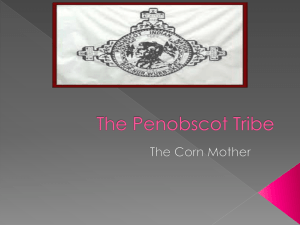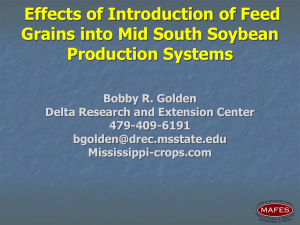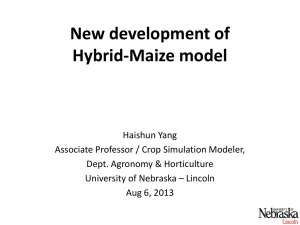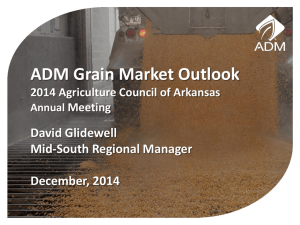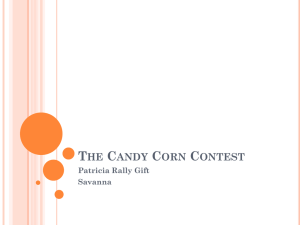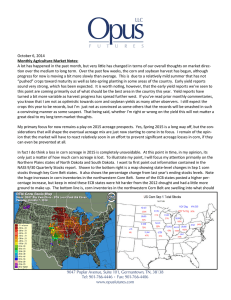Controlled and Delayed Release Nitrogen Fertilizer Trials
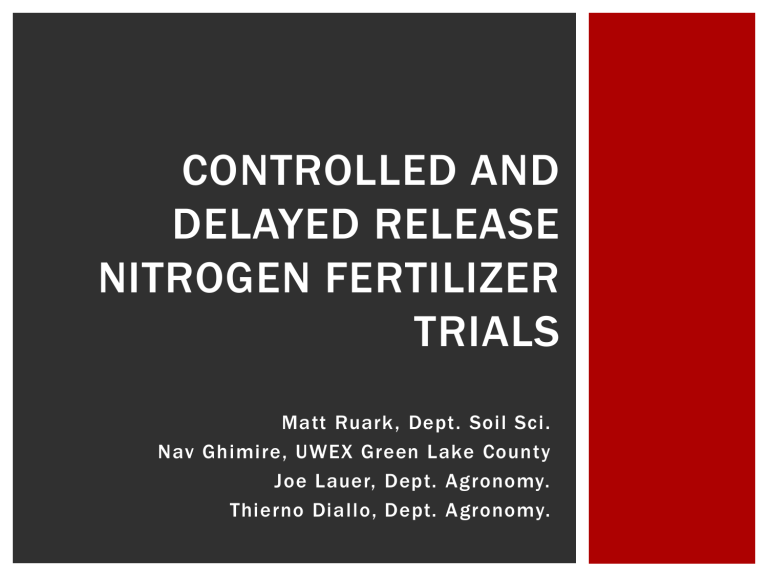
CONTROLLED AND
DELAYED RELEASE
NITROGEN FERTILIZER
TRIALS
Matt Ruark, Dept. Soil Sci.
Nav Ghimire, UWEX Green Lake County
Joe Lauer, Dept. Agronomy.
Thierno Diallo, Dept. Agronomy.
NITROGEN FERTILIZERS
Controlled-release
Polymer-coated
ESN® (Agrium)
The polymer coating expands with heat, allowing water in to dissolve the urea.
The soluble N then diffuses out of the porous coating.
NITROGEN FERTILIZER
Delayed release
Contains a chemical that stops part of the N cycle
Urease inhibitors
Inhibits conversion of urea to ammonia
NBPT
Agrotain
Nitrification inhibitors
Inhibits conversion of ammonium to nitrate
DCD
SuperU (contains both NBPT and DCD, impregnated into the urea granule)
QUESTION
Is there a reliable benefit to using PCU, urease inhibitors, or nitrification inhibitors in
Wisconsin?
These products come at a premium so there needs to be an economic benefit when using them.
Greater yield at the same rate of N
Same yield with lower rate of N
N FERTILIZER TRIALS IN WISCONSIN
Arlington, WI
SuperU, ESN, and ammonium nitrate (AN) on corn
Green Lake, WI
SuperU, Agrotain, ESN, and urea on no-till corn
2009-2012 TRIALS
Part of long-term rotation and tillage study at
Arlington, WI
Rotation
Corn following corn
Corn following soybean
Tillage
Chisel plow
No-till
N applied at planting at a rate of 180 lb/ac
Chisel Plow systems
Prev.
Crop
Corn Yield
N Source 2009 2010 2011
Corn AN
ESN
SuperU
224 260
212 261
213 249 bu/ac
193
186
188
Soybean AN
ESN
SuperU
246 268 210 b
240 272 223 a
249 268 201 b
2012
172
157
161
201
196
206
Average
212
204
203
231
233
231
No-till systems
Prev.
Crop
Corn Yield
N Source 2009 2010 2011
Corn AN
ESN
SuperU bu/ac
207 224 ab 183
207 236 a 186
207 216 b 177
Soybean AN
ESN
SuperU
248 264 223 a
241 253 218 a
239 255 208 b
2012
160
167
161
203
182
201
Average
194
199
190
235
224
226
2012 AND 2013 TRIALS
Location: Green Lake County
Two fields per farm
Corn following corn (no-till)
Corn following soybean (no-till)
APPROACH
Fertilizers
Urea
Agrotain
SuperU
ESN
Rate
“recommended” vs. 20% reduction
CC: 170 vs 135
CS: 150 vs 120
Controls (unreplicated) of 0 and 200 lb/ac N
ECONOMICS
Assuming…
Urea is $550/ton (~$0.60/lb-N)
ESN is $750/ton (~$0.82/lb-N)
If N application is 150 lb-N/ac and
if corn is $4/bu, then need 8 bu/ac gain
If corn is $5/bu, then need 6-7 bu/ac gain
2012 CORN-CORN
135 VS. 170 LB-N/AC
2012 Corn Yields, Green Lake County
Corn following corn / Sandy Loam
180
160
140
120
100
80
60
40
20
0
U re a
U re a
A gr ot ai n
A gr ot ai n
S up er
U
S up er
U
E
S
N
E
S
N
N on e
U re a(
20
0)
2013 CORN-CORN
135 VS. 170 LB/AC
2013 Corn Yield, Green Lake County
Corn following corn, Sandy Loam
250
200
150
100
50
0
U re a
U re a
A gr ot ai n
A gr ot ai n
S up er
U
S up er
U
E
S
N
E
S
N
N on e
U re a(
20
0)
200
2013 CORN-SOYBEAN
120 VS. 150 LB-N/AC
2013 Corn Yield, Green Lake County
Corn following soybean, Sandy Loam
150
100
50
0
U re a
U re a
A gr ot ai n
A gr ot ai n
S up er
U
S up er
U
E
S
N
E
S
N
N on e
U re a(
20
0)
RESULTS
These data show that yield gains when applying optimum N rates are not often nor consistently observed.
The rainfall patterns of the season will create the situation where the product is valuable or not
(i.e. early season intense rains).
These products were applied at planting. Perhaps greater value if applied 2-3 weeks prior to planting (i.e. more time to protect).
The products work, but need to be tested on your fields to find the benefit, mostly likely coming from reduced N rates.
WHERE IS THE VALUE?

